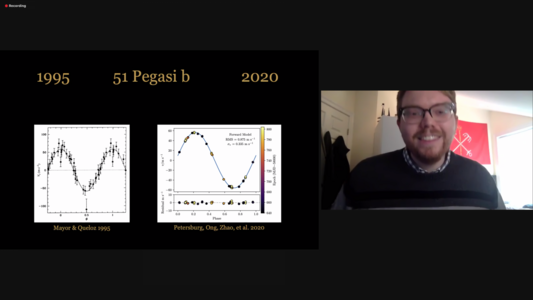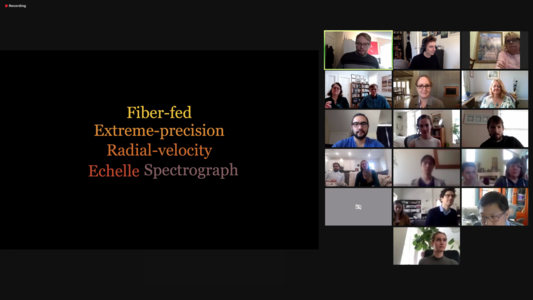
On March 3, 2021, Ryan Petersburg successfully defended his thesis, “Exoplanet Measurement to the Extreme: Novel Methods of Instrumentation and Data Extraction for Radial-velocity Spectrographs” (Advisor: Debra Fischer).
Petersburg explained, “Discovering planets outside our solar system using the radial-velocity technique, which measures the wobble of the star as it is pulled by an orbiting planet, requires the utmost precision of physical measurement. The instruments that make these measurements, called radial-velocity spectrographs, are extremely complex devices that are truly a feat of optical design and engineering. My work entails tuning many aspects of one such instrument, the EXtreme PREcision Spectrograph (EXPRES), such that it can become capable of detecting Earth-like exoplanets orbiting Sun-like stars. This has involved studying noise sources caused by optical fibers, prototyping new laser technologies, and developing advanced image analysis techniques to extract our data. EXPRES is now well on the way towards finding if life really is possible somewhere out there in our galaxy.”
Petersburg is still deciding what to do post degree.
Thesis Abstract: The current generation of radial-velocity spectrographs are at the precipice of discovering a multitude Earth-like exoplanets orbiting in the habitable zones of nearby stars. Such detections require Doppler precision of approximately 10 cm s-1, an order of magnitude better than the typical best-case measurement from the previous generation of instruments. Therefore, the radial-velocity community requires research and innovation from all angles to push our technology over the brink. This thesis present multiple contributions to this field—ranging from the development of precision laser equipment to the implementation of advanced statistical data analysis algorithms—all in support of the EXtreme PREcision Spectrograph with the goal of improving instrument precision and exoplanet detection capability.

